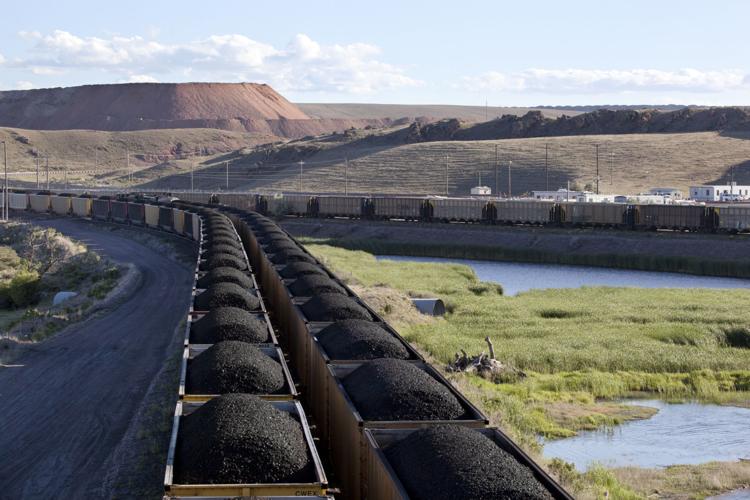Peabody Slashes Health Benefits for Older Retirees

November 25, 2020 - In a cost-cutting move, Peabody Energy Corp. is slashing some health and life insurance benefits for retirees at the end of the year.
Retirees older than 65 have been notified that their health benefits will disappear after Dec. 31 and all retirees will have their life insurance terminated, according to a statement from the company.
The move is expected to save the company nearly $175 million and will ensure Peabody retirees younger than 65 who aren’t yet eligible for Medicare can maintain their coverage, the company said.

Loaded coal trains move out from the North Antelope Rochelle coal mine south of Gillette.
Photo: News Record File Photo
“The change in financial support is designed to maintain Peabody’s retiree medical subsidy where it is needed most — for retirees and spouses who are not yet age 65 and Medicare-eligible,” the statement said.
It’s the latest financial move for the nation’s largest coal producer in a challenging year. Peabody wrote down the value of its largest asset, the North Antelope Rochelle mine in Campbell County, by $1.42 billion earlier this year. And in its third-quarter filings with the Securities and Exchange Commission, Peabody reported that it could be heading toward a second bankruptcy since 2016.
For those affected by the move, losing an important benefit after decades of backbreaking work mining coal is a hard pill to swallow, said Gloria Buell.
Between them, Gloria and her husband Rick Buell have 30 years of working at Peabody mines in the Powder River Basin. She worked for Peabody for 10 years, while Rick worked for 20.
They both retired in 2017 and now, at age 67, are faced with having to pay out-of-pocket for their supplemental health insurance starting in January, Gloria said.
“I know this has affected a lot of people,” she said. “For one thing, it hurts our pocketbook. It’s just one more thing Peabody has taken away from us.”
She said the company had already ended its pension program years ago, and now targeting health care for people just because they’re eligible for Medicare seems unfair.
“When I got the letter and the last time I called (the company), we had tons of money in there,” she said about her health care account. “But according to Peabody, the money really wasn’t there and that Peabody was just paying it.”
That $200,000 was enough for Gloria and Rick to cover their supplemental insurance for the rest of their lives, she said. Now it’s gone.
“We thought it would last the rest of our lives, but that’s not going to happen,” she said. “I don’t understand that.”
That benefit is one of the reasons workers are willing to take the punishment of coal mining for decades, because they know that after retirement they’ll have more medical problems to deal with, Gloria said.
“That’s what a lot of what people were working for, because they knew they had that money so they could retire,” she said. “The counted on it to keep their medical costs low.”
She said those benefits are referred to by employees as “the bucket of money,” but the fine print on Peabody’s retirement paperwork says the company can change or take it away at any time.
Just how many Peabody retirees in Wyoming and overall are affected by the move wasn’t immediately known, but slashing retirement benefits isn’t new for PRB coal companies.
Alpha Natural Resources cut benefits during its 2015 bankruptcy and Cloud Peak Energy did the same in 2018 prior to filing for Chapter 11 reorganization in 2019.
While one Peabody retiree in Illinois reportedly has vowed to pursue a class-action lawsuit against Peabody over the cuts, Gloria isn’t holding her breath that it could be successful.
“Oh, hell yeah, I’d like that, but I think they’ve got you because of that (fine print),” she said. “I don’t think that even if you took it to court it would do you any good.”
In the end, the Buells and many older Peabody retirees will have to tighten their belts more, because the alternative is going without their supplemental health insurance, which isn’t an option.
“Medicare still pays a certain amount, but you still have to pay for a supplement,” Gloria said. “We’ll just have to do it. You don’t have any choice.”

